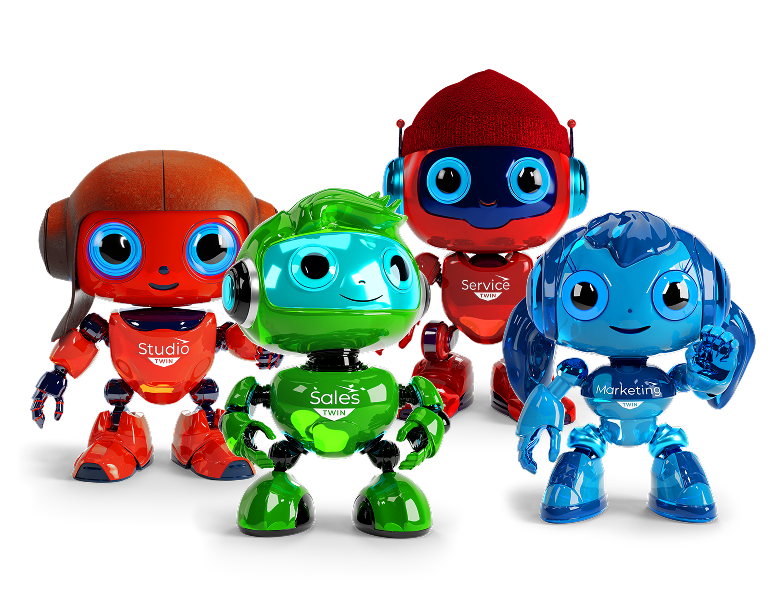-
No-Code
Platform
-
Studio
No-code agentic platform delivering the fastest time-to-value and the highest ROI
-
Studio
-
AI-Native CRM
CRM
-
AI-Native CRM
New era CRM to manage customer & operational workflows
CRM Products -
AI-Native CRM
- Industries
- Customers
- Partners
- About
Create AI Agents & Build Agentic AI Workflows with Creatio

According to Creatio’s Global Survey Report, 86% of C-level decision-makers believe AI agents will be strategically important within the next two to three years. This reflects a growing understanding that AI is now becoming a core driver of business performance, innovation, and efficiency.
As organizations move toward an agentic AI strategy, the terms “AI agents” and “agentic AI” are often considered interchangeable. However, they represent distinct concepts with very different levels of autonomy, intelligence, and impact.
In this article, we’ll explain the difference between agentic AI vs. AI agents, explore some use cases of these technologies across the industries, and share future trends on adopting agentic AI solutions to accelerate business growth.
Key Takeaways:
- AI agents focus on automating specific tasks and routine operations, while agentic AI excels at managing complex, multi-step workflows and coordinating multiple agents in real time.
- Agentic AI is best suited for midsize to large organizations that need to manage complex processes at scale. In contrast, AI agents are ideal for all businesses seeking quick automation of targeted workflows without major infrastructure changes.
- Agentic platforms are emerging as the go-to solution for enterprises aiming to create custom AI agents, build connected multi-agent ecosystems, and orchestrate end-to-end workflows that drive sustainable business growth.
The State of AI Agents & No-Code
Learn how 560+ leaders across the world use AI and no-code to drive innovation today
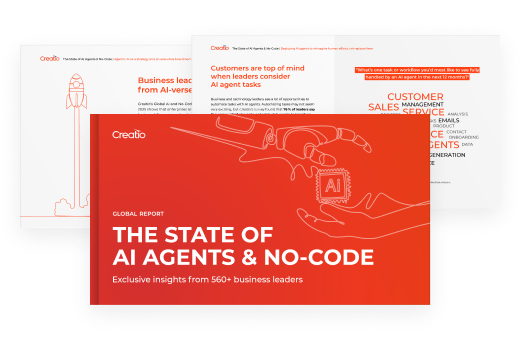
What are AI Agents?
AI agents are intelligent software systems designed to complete specific tasks, make decisions, and achieve goals on behalf of users with minimal human input. They use technologies such as machine learning, natural language processing (NLP), and large language models (LLMs) to reason, plan, and adjust their actions in real time.
Often described as “digital co-workers,” AI agents can operate fully autonomously or work alongside human teams. AI agents can work independently or side by side with human teams. For example, they can generate a sales quote, prepare notes for a meeting, or create a summary of a discussion. Their main purpose is to take over repetitive work, simplify workflows, and scale operations efficiently — freeing employees to focus on strategy, creativity, and higher-value tasks.
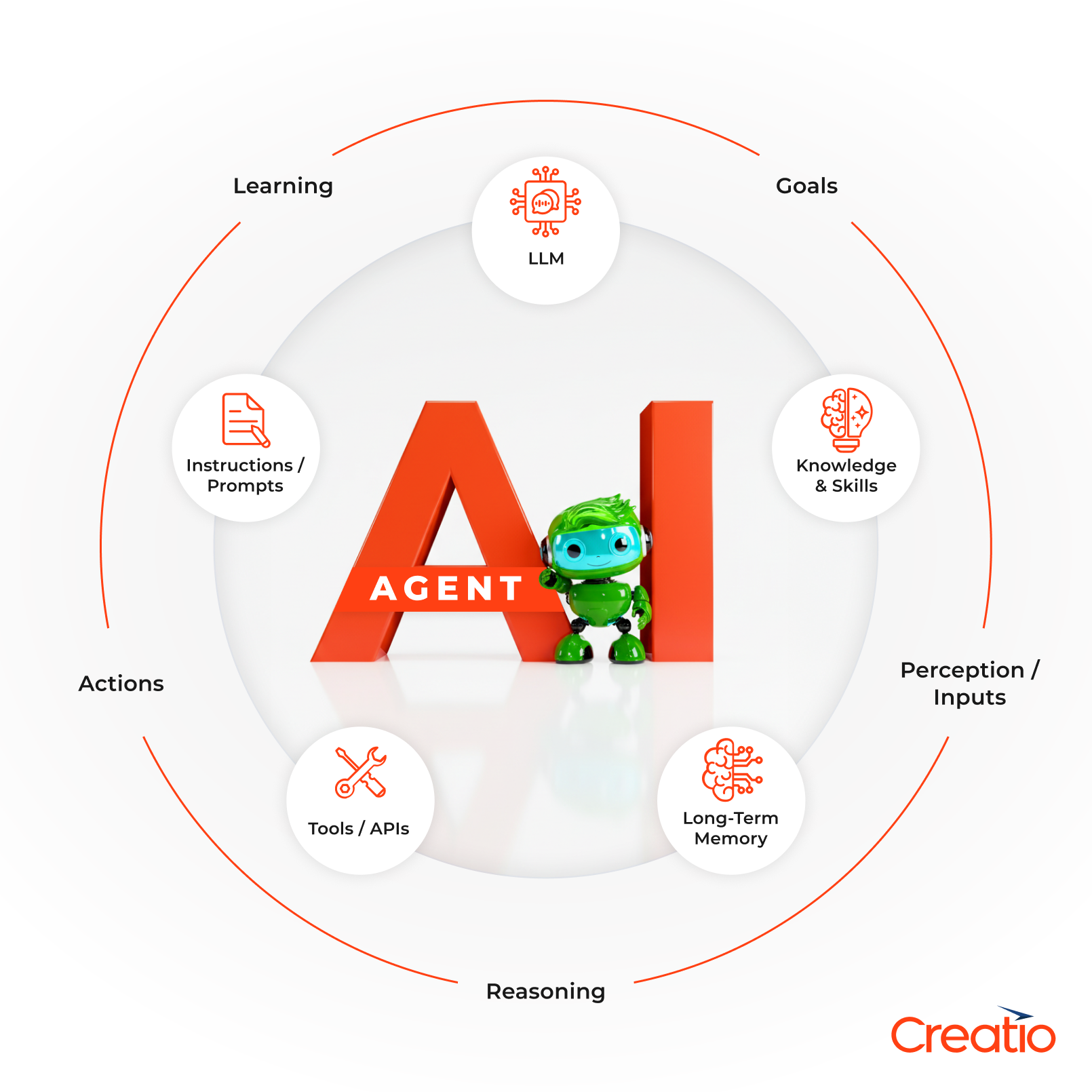
What is Agentic AI?
Agentic AI is a more advanced form of artificial intelligence that enables autonomous systems to plan, adapt, and orchestrate multiple AI agents to achieve larger goals.
Unlike generative AI, which creates content based on prompts, agentic AI can perceive its environment, set objectives, and act proactively through the agents it manages. This makes it far more autonomous and capable of handling complex, multi-step processes and workflows compared to an individual AI agent.
Think of it as a project manager for AI agents. While each agent focuses on a specific task, agentic AI coordinates their work, resolves issues as they arise, and adapts in real time to changing conditions. As a result, agentic AI systems enable end-to-end automation and smarter decision-making at scale.
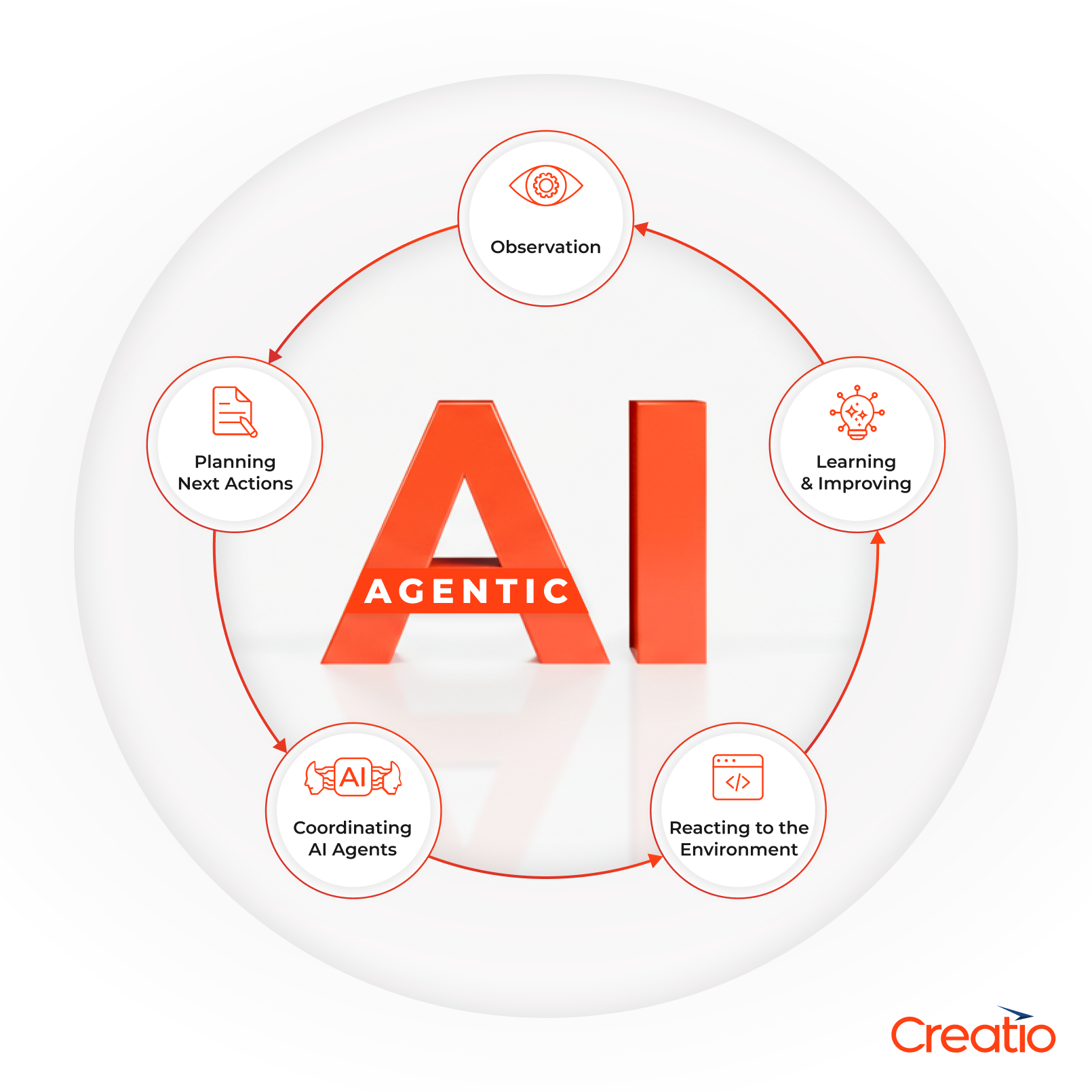
Agentic AI vs AI Agents: Key Differences to Know
Even though AI agents and agentic AI are both powered by artificial intelligence, they operate on very different levels. AI agents are more task-focused, while agentic AI coordinates multiple agents to deliver outcomes across entire workflows.
Here’s a more detailed comparison of their key differences:
Aspect | AI Agents | Agentic AI |
| Scope | Execute specific tasks | Orchestrate multiple agents to achieve broader, multi-step goals |
| Autonomy | Limited — operate within defined rules or prompts | High — act proactively, plan ahead, and adapt without constant human input |
| Decision-Making | Handle decisions in a narrow context | Manage complex decisions across agents and workflows |
| Adaptability | React to inputs and follow instructions | Continuously adjust to changing conditions to optimize outcomes |
| Examples | Role-based agents like Account Research agent, Meeting Preparation agent, Email Generation agent, Customer Support agent, etc | Agentic platforms like Creatio Studio, UiPath, Langchain, and others |
Who Should Use Agentic AI?
Agentic AI is best suited for midsize to large organizations that need to manage complex, multi-step processes at scale. It’s the right choice when workflows span multiple teams or departments and require continuous planning, coordination, and adaptability. In these cases, agentic AI can orchestrate agents through a unified agentic platform, ensuring alignment, and implement changes in real time.
Who Needs AI Agents?
AI agents are a better fit for any company or team that wants to automate specific tasks or workflows quickly, without major infrastructure changes. They’re especially useful for teams looking to optimize repetitive, routine processes like drafting sales quotes, updating CRM records, scheduling meetings, and more.
For many organizations, AI agents also serve as a practical first step toward broader AI adoption. In fact, according to Creatio’s 2025 Global Survey Report, 3 in 4 business and technology leaders expect AI agents to augment teams and drive growth by empowering staff to focus on higher-value work.
Common Use Cases of AI Agents and Agentic AI
Both AI agents and agentic AI can be applied across similar industries, but they serve very different purposes. Here are some of the most popular use cases for both technologies that highlight where each can deliver the most value:
Sales & Revenue Operations
- AI Agents: Help sales teams accelerate workflows by auto-generating quotes, updating CRM records, drafting follow-up emails, and summarizing client meetings.
- Agentic AI: Powers agentic CRM systems that oversee the entire sales pipeline, from lead qualification and proposal generation to forecasting, task assignment, and deal closure to ensure faster conversions.
Finance & Banking
- AI Agents: Automate and optimize back-office operations such as invoice processing, data entry, and report generation.
- Agentic AI: Manages end-to-end financial workflows such as credit approvals, compliance checks, and fraud detection by coordinating role-specific AI agents.
Insurance
- AI Agents: Handle repetitive activities like policy data updates, claims intake, and customer inquiries.
- Agentic AI: Oversees the entire claims lifecycle, from initial submission and risk assessment to case routing and settlement to maximize efficiency and improve customer satisfaction.
Customer Support Orchestration
- AI Agents: Supports service operations by auto-responding to tickets, summarizing cases, or suggesting next best actions.
- Agentic AI: Acts as the manager that assigns tasks across agents, analyzes customer sentiment, and identifies recurring issues across communication channels to maintain consistent service quality.
Supply Chain & Logistics
- AI Agents: Automate inventory tracking, process shipment updates, and generate delivery notifications to keep operations running smoothly.
- Agentic AI: Coordinates multiple agents across procurement, logistics, and demand forecasting to optimize inventory, predict delays, and re-routing shipments.
These are just a few examples of how AI agents and agentic AI can be applied across industries to transform operations and drive growth. As more organizations move toward AI-powered systems, adopting these technologies is becoming the foundation of business success today.
Future Trends Around the Agentic AI & AI Agents Adoption
With growing interest in AI agents and no-code solutions, Creatio conducted a global survey — The State of AI Agents & No-Code — to explore how more than 560 business leaders foresee the role of AI and no-code in driving innovation today and in the years ahead.
According to Creatio’s Global Survey Report:
- Agentic AI is a boardroom priority: more than 4 in 5 business leaders believe AI agents will be strategically important within the next 2–3 years.
- AI agents will augment, not replace, humans: 84% of executives say AI agents will enhance how people work rather than reduce headcount.
- No-code is fueling AI adoption: 59% of C-level decision-makers are confident using low-code/no-code tools to build AI-enabled solutions and agents.
The report once again highlights that AI is now at the core of business strategy for forward-thinking organizations. Leaders now view it as the key technology that relieves humans from repetitive, low-value tasks and enables them to reimagine possibilities, innovate faster, and drive meaningful business changes.
At the same time, AI-native, no-code platforms are emerging as the most effective way to scale adoption, break down barriers, and embed intelligence directly into workflows. By empowering every business user to build, adapt, and deploy AI-driven processes, these platforms are democratizing innovation and accelerating transformation across the enterprise.
Augment Your Business Results with Creatio’s Agentic Platform
At Creatio, we understand how critical it is for every organization to stay ahead in an AI-first world. Our agentic platform — Creatio Studio — is a next-generation, no-code solution that empowers users to build applications and AI agents using natural language and intuitive visual designers. Its agentic AI capabilities, enhanced by both generative and predictive AI, enable any user to automate routine tasks, scale operations, and accelerate growth with unprecedented speed and flexibility.
Creatio’s AI agents are natively embedded across every layer of the platform. They have full awareness of data objects, relationships, workflows, and processes — allowing them to autonomously understand, act, and learn within any business environment. With conversational AI capabilities, users can interact with agents naturally, just as they would with their teammates.
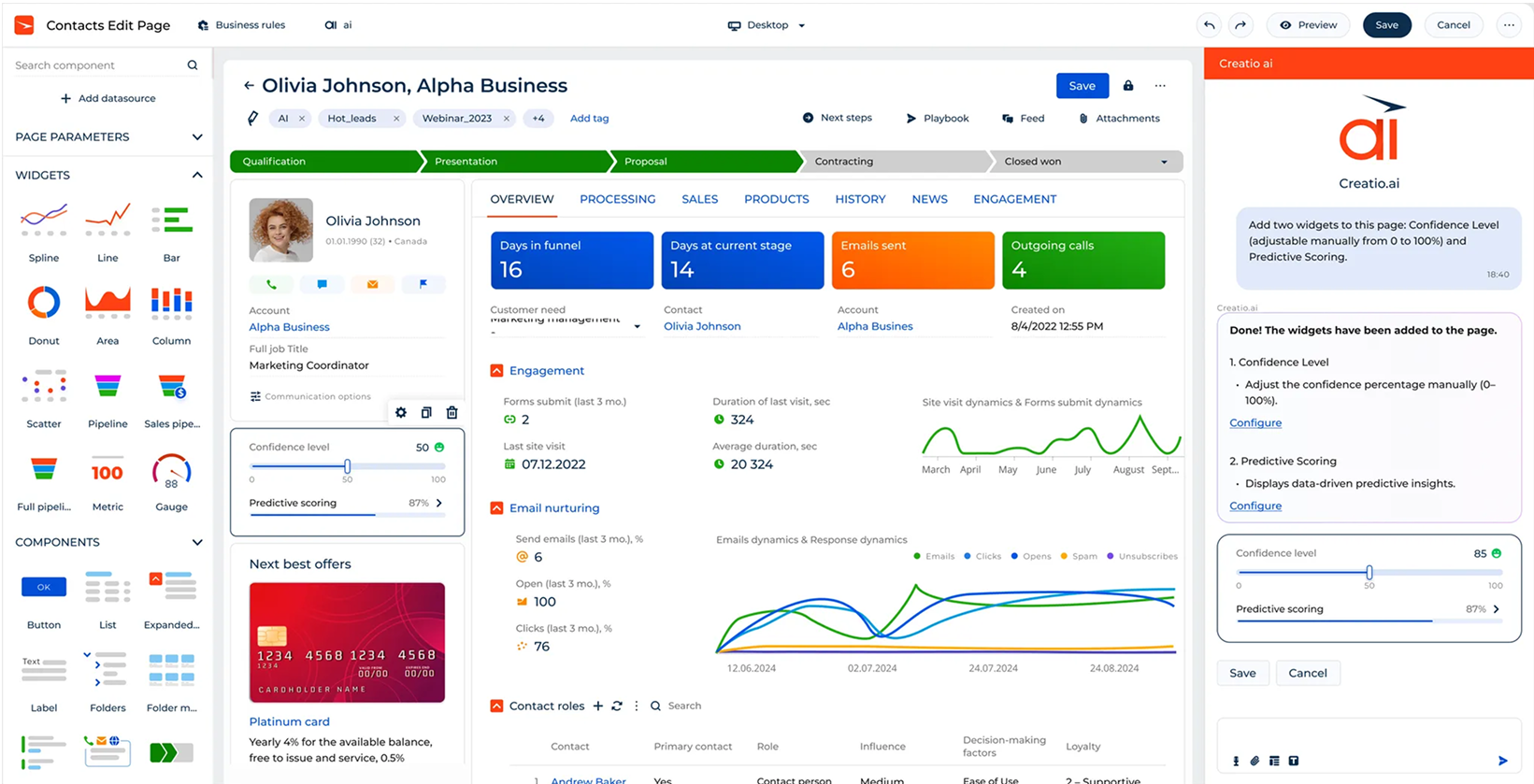
Standout Features:
- Out-of-the-box AI agents for CRM and workflow automation to streamline sales, marketing, and service operations.
- No-Code Agent Builder to create custom agents tailored to your unique workflows and business needs.
- AI Command Center to monitor AI usage, manage skills, and oversee user interactions with agents.
- Creatio.ai integrations with productivity tools like Microsoft Outlook and Microsoft Teams for seamless collaboration.
- Industry-specific solutions for 20+ sectors, ensuring a perfect fit for diverse business needs.
- Over 400 third-party add-ons and applications available at Creatio Marketplace to extend the platform’s functionality even further.
Creatio’s agentic platform has a composable pricing model that allows businesses to pay only for the products they use. It offers three plans: Growth ($25 per user/month), which best fits SMB clients; Enterprise ($55 per user/month), which enables full-scale agentic automation for corporate and enterprise needs; and Unlimited ($85 per user/month), which delivers limitless automation for advanced enterprise scenarios.
Based on their current needs and strategic goals, businesses can also deploy ready-to-use CRM products for Sales, Marketing, and Service, each priced at $15 per user/month and available for purchase separately or as a complete CRM suite.
Summary
As companies move toward AI-first operations, understanding the difference between AI agents and agentic AI is key to modern process transformation. AI agents automate specific tasks, while agentic AI connects and manages multiple agents to handle complex, multi-step workflows. Together, they help organizations increase efficiency and deliver faster, smarter business results.
With years of expertise in automation and AI innovation, Creatio offers a no-code agentic platform that empowers organizations to design, coordinate, and scale intelligent workflows, all powered by AI agents and agentic AI solutions.




















































